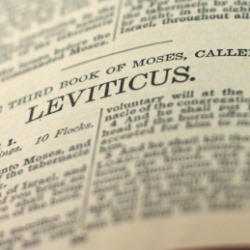
Vayikra
| Leviticus 1:1-5:26 | Ezekiel 45:1646: | 18 Mark 7:130 |
 Leviticus, 3rd Torah book, Hebrew - Vayikra ( ויקרא first word of the
text, meaning " and יהוה called ”)Also called Torat Kohanim, the Teaching of Priests. Leviticus, 3rd Torah book, Hebrew - Vayikra ( ויקרא first word of the
text, meaning " and יהוה called ”)Also called Torat Kohanim, the Teaching of Priests.Do we hear the Father's call? Do we hear thunder? Or an angel? Still small voice? Moses heard when יהוה called. How was he able to hear? He was meek. Numbers 12:3 (Now the man Moses was very meek, above all the men which were upon the face of the earth.) Matthew 11:29 [Yahshua said] Take my yoke upon you, and learn of me; for I am meek and lowly in heart: Psalm 25:9 The meek will he guide in judgment: and the meek will he teach his way 1Peter 3:4 But let it be the hidden man of the heart, in that which is not corruptible, even the ornament of a meek and quiet spirit, which is in the sight of God of great price. Meekness (humbleness) allows us to hear. Meekness is a most important character trait. |
| Sacrifice • Lev 1:3-9 ‘If his offering is a burnt offering of the herd, let him bring a male, a perfect one...at the door of the Tent of Meeting, for his acceptance before יהוה . ... to make atonement for him.... he shall slaughter the bull before יהוה . ... a sweet fragrance to .יהוה Lev 1:10-13 ‘And if his offering is from the flock, from the sheep or from the goats. ... a sweet fragrance to .יהוה • Olah: A sacrifice to be burned on the altar, brought from cattle, goats, sheep, or birds. • Minchah: An offering of grain mixed with oil (and frankincense). Part was burned on the altar, and the priests consumed the remainder. • Shelamim: A peace offering, part of which was burned on the altar, the remainder eaten by the priest and the one who offered the sacrifice. • Chatat: A sin offering brought for accidental transgressions. The exact procedure was different for private individuals, public officials, and instances of communal guilt. • Asham: A guilt offering brought for specific sins. |
| Giving of a sacrifice is a test of the heart. Giving the best? A
willingness to release to Him something
of important value. Each time it is to be a sweet fragrance to יהוה .
Indicating a genuiness in
acknowledging יהוה for who he is. Leviticus 2:13 And every oblation of thy meat offering shalt thou season with salt; neither shalt thou suffer the salt of the covenant of thy God to be lacking from thy meat offering: with all thine offerings thou shalt offer salt. Salt adds flavor to a dish that might otherwise be tasteless or bland. The salt is kavanah, (Intention or "direction of the heart") the mindset, the intensity with which we do good, learn Torah, pray, etc. It's quality that matters. It is called “the covenant of God.” It is of utmost importance. The bottom line: And thou shalt love יהוה thy God with all (kol) thine heart, and with all thy soul, and with all thy might. Deuteronomy 6:5 All else comes after Him. |